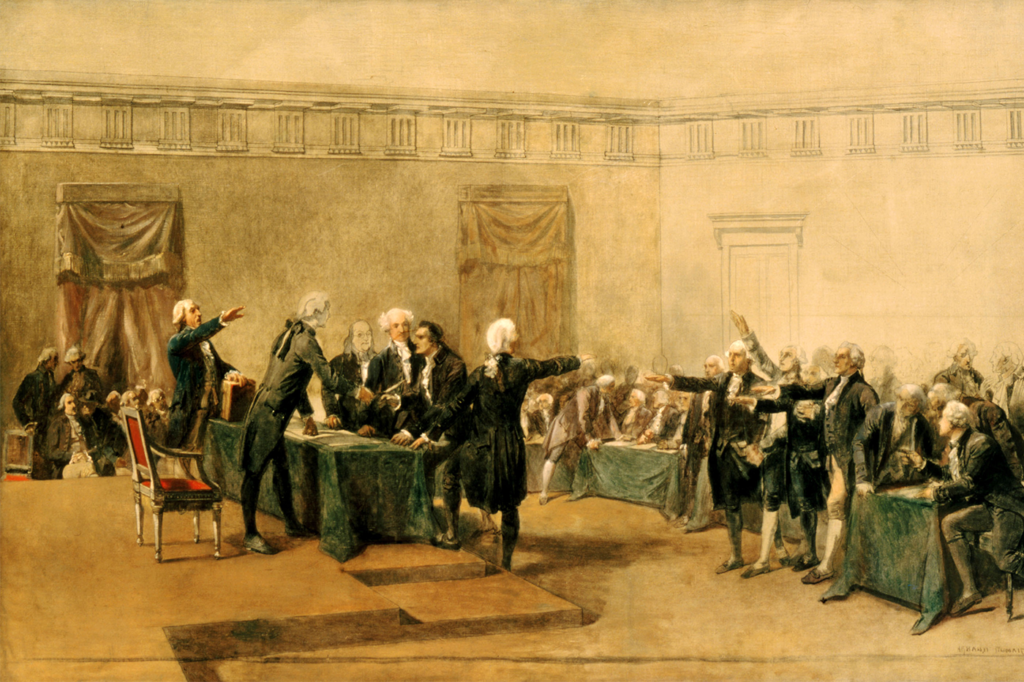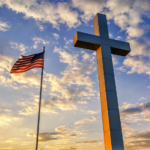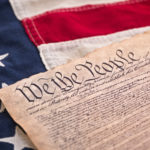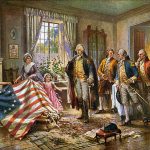The question of the relationship between the American Founding’s ideals and the Christian faith is as old as the Mayflower Compact. The line between secular and religious has never been plainly visible in American history. The famous “wall of separation” has never really amounted to more than a picket fence. It is not surprising, then, that declining confidence in American institutions and declining conviction in American ideals has occurred in parallel with declining religiosity in the United States. Any attempt to reverse the former must contend with the ongoing impact of the latter. What, though, is the nature of the relationship between the secular and the religious in American political thought and history?
Kody Cooper and Justin Dyer’s The Classical and Christian Origins of American is an elegantly written, tightly argued, and profoundly thoughtful contribution to the recurring debate over this question. Cooper and Dyer’s deep immersion in the historical and ongoing conversation about the role of religion in American political life, and their contributions to this conversation, will provide a touchstone for scholars and commentators for years to come.
Cooper and Dyer successfully refute the still (somehow) influential interpretation of the American Founding as a secular-not-Christian project. However, they do so without, in this reviewer’s opinion, successfully establishing their preferred alternative, the Christian-not-secular interpretation. There is a vast middle between these two extremes whose existence slips through the authors’ fingers again and again across the book’s pages like a well-greased elephant. This middle option may be described as follows: the American experiment is a novus ordo seclorum that has coexisted with and drawn support from the classical–Christian order that preceded it.
What is the nature of the relationship between the secular and the religious in American political thought and history?
Start your day with Public Discourse
Sign up and get our daily essays sent straight to your inbox.Natural Law
Despite ultimately missing the bullseye on the question whether the Founding is ultimately a Christian or secular project, the book makes noteworthy contributions on the relationship between natural law theory and American political thought. The first of these occurs in the introductory chapter’s treatment of the question “What is Natural Law?” In addition to providing one of the most succinct and accessible descriptions of natural law available in recent literature, in this section the authors very helpfully highlight natural law’s relevance to American constitutionalism, in contrast with “Hobbist” absolutism. Cooper and Dyer define the natural law as “the moral law for human beings known to reason through rationally apprehended goods, rationally discerned moral obligations, and the freedom of the will to choose to obey or disobey this law.” By tethering moral obligation to reason rather than force, the natural law requires political constitutionalism rather than absolutism—“reflection and choice” rather than “accident and force,” to quote the first Federalist essay.
The authors’ discussion of the pamphlet debates in the decade preceding the Declaration of Independence is also excellent. They successfully establish the importance of natural theology to the colonists’ arguments throughout this time. They also show how natural theology informed other important lines of argumentation (such as debates about the British imperial constitution). Of particular note in this context is the illuminating discussion of James Otis, who, along with another James (Wilson), provides a central case for the authors’ overall account. Cooper and Dyer expound insightfully on Otis’s belief in the existence of a “supreme ruler of the universe” who governs all of nature—inanimate as well as human—through necessary laws. Just as rocks fall to the ground, so human beings are naturally drawn to moral goods and bound by moral obligations. This framework is, the authors show, essential to appreciating Otis’s arguments about the British imperial constitution and the rights of the colonists.
By tethering moral obligation to reason rather than force, the natural law requires political constitutionalism rather than absolutism—“reflection and choice” rather than “accident and force,” to quote the first Federalist essay.
The book’s treatment of sovereignty and constitutional theory is another signal contribution to scholarship. Cooper and Dyer persuasively establish the direct relevance of natural law theory to the concept of popular sovereignty, connecting popular sovereignty to American constitutionalism in clear and compelling terms. Drawing primarily on James Wilson and James Madison, they explain how popular sovereignty relies on individual sovereignty, and how individual sovereignty in turn was conceived by these leading theorists of the founding in the context of both natural law and natural rights.
When it comes to constitutional authority and interpretation, the authors successfully illustrate how their natural law-based account speaks to current debates about the American Constitution. This occurs through a nuanced discussion of the “voluntaristic originalism” espoused in various ways by constitutional scholars such as Bruce Ackerman, Keith Whittington, and Randy Barnett. While agreeing with these scholars on the importance of popular sovereignty in establishing constitutional legitimacy, Cooper and Dyer argue persuasively that “the people’s constitution-making power [was] an exercise of reason rather than will.”
Secondary, Dispensable Causes?
It is in the context of this discussion of sovereignty that the aforementioned greased elephant enters the room most forcefully. Orestes Brownson, as Cooper and Dyer explain, elaborated on the theological doctrine of “secondary causation.” This is the idea that God creates certain things (“substantial existences”) that then act as causes for other things. Human beings are good examples of secondary causes, because they act through reason and free will to accomplish their own purposes. Human beings’ role as secondary causes is, as the authors note, closely connected with Aquinas’s definition of natural law as “a form of participation in the eternal law.”
Cooper and Dyer emphasize the fact that human beings’ causality is secondary, subject to and ordered teleologically toward the prime cause (God). The magnitude of God’s primary causality and the primacy of His purposes end up eclipsing the significance of secondary causality in the remainder of this and related discussions throughout the book. The ontological dependence of secondary causes appears to translate into their ultimate dispensability or irrelevance because, after all, the buck ultimately stops with God.
The authors wrestle frequently with the idea that the natural law is supposed to be accessible to unaided reason, and the attendant idea that reason is supposed to be able to gain knowledge and guide action apart from revelation. What, then, is the relationship between reason and faith, or between natural law and eternal or divine law? If you have the latter, do you really need the former? If the latter really exist, do the former have independent existence at all? Does the possession of faith eliminate the need for reason, and does the recognition of the eternal or divine laws obviate the need for the natural law? Is reason really just faith’s substitute for the nonbeliever, and natural law really just divine law’s substitute for the non-Christian?
These and related questions hover over many of the book’s discussions, and the authors’ persistent hesitation to address them leads to the “missing middle” problem that plagues the book’s overarching account. Whenever a non-theological concept comes into contact with a theological one, its significance effectively vanishes. Secondary causes collapse into the Primary Cause, natural theology becomes a branch of revealed theology, political ideology becomes religion, the state bows to the church, and the natural law is baptized Christian.
Ownership and Imago Dei
This phenomenon is especially evident at a few key moments in the book. The first is the book’s recurring references to the imago Dei doctrine in the Book of Genesis. The authors see a connection between this principle of revealed theology and the secular idea of human dignity. Cooper and Dyer consider this connection in discussing Locke’s theory of property, and particularly Locke’s disagreement with the idea that children are owned by their parents. They dismiss the Lockean argument that “there is something intrinsic to persons barring them from being owned by their makers” because “[t]o be an imago Dei does not per se shield one from being owned, because by that very fact one is owned by God.”
This is not quite true, though. It is not by virtue of being made in a certain way—as an imago Dei—that human beings are owned by God; it is by virtue of being made by God simply. Squirrels are similarly owned by God because they are made by God, but they are not made in God’s image and likeness. Moreover, being made in God’s image and likeness might shield one from being owned by another creature without shielding them from being owned by God. It is possible, as Cooper and Dyer note in citing one of my articles, to be simultaneously owned by God and to own oneself in a way that excludes ownership by other human beings.
It is not by virtue of being made in a certain way—as an imago Dei—that human beings are owned by God; it is by virtue of being made by God simply.
This difficulty reemerges at the end of the book, when Cooper and Dyer state that “[t]he Declaration and other founding era sources clearly rooted the value and dignity of persons in a transcendent Creator, who was the source of value in the world, and apart from whom that world did not have value. Human dignity was and is, at bottom, a theological concept.” This passage perfectly illustrates the missing middle problem of the book’s account. Of course it is true that without the Creator the world wouldn’t have value; but this is because the world wouldn’t exist at all. Does the fact that squirrels wouldn’t have bushy tails without the Creator mean that the bushiness of squirrels’ tails is a theological concept?
The question here is similar to the question that separates the voluntarists and the rationalists, and that Cooper and Dyer consider at length: is creation good because God created it, or did God create this way because it was good to do so? Is there some secondary goodness in creation that is related to but not identical with the primary goodness of God? In the case of human dignity we seem to have a clue in the biblical account of creation in the imago Dei. Every being other than God is created, but only human beings are created in God’s image and likeness. The simple fact of creation does not bestow any special dignity on human beings that is not shared by all other creatures. It is the unique fact of creation in God’s image and likeness that roots the concept of human dignity in the Bible. But what does it mean to be created in God’s image and likeness? The Bible does not say. Human dignity is thus a theological concept in one way—because the meaning of creation in the imago Dei presumes some knowledge of God—but it is a philosophical concept in another way, because the question of what God’s image in humanity is is nowhere revealed directly by God.
A Missed Middle
A recognition of the missing middle would also have allowed Cooper and Dyer to more successfully account for some key elements of the American political tradition that are either excluded, downplayed, or otherwise mishandled in the book. One of these is Thomas Paine’s Common Sense, which is alternately dismissed as “an outlier” despite its incredible popularity and influence, and then rescued as being centrally concerned with biblical interpretation. Another is Abraham Lincoln’s civil religion, which is affirmed to be “in essential continuity with the classical Christian natural-law philosophy” without substantial argumentation, despite the fact that Lincoln would probably be even more difficult to bring into the Christian natural law fold than Jefferson was (and he has an entire chapter dedicated to him).
Lastly, there is the book’s concluding statement that “sectarian confessional states . . . are, in our view, in principle within the ambit of prudence as a constitutional arrangement.” Although the authors do, to be fair, describe and qualify this approval in such a way as to distinguish it substantially from the position of church–state integralists, this statement sits very uneasily with key strains of the American political tradition. One need look no farther than James Madison’s “Memorial and Remonstrance Against Religious Assessments,” Thomas Jefferson’s Statute for Religious Liberty, or Alexis de Tocqueville’s Democracy in America (not to mention the First Amendment itself) to appreciate the fact that Cooper and Dyer steer wide of the course set by American Founding thought on this question. The reason for this is the same as in the case of accounting for people like Paine and Lincoln or explaining the concept of human dignity: because the purposes of the secular state are ultimately ordered to those of the church, the intrinsic meaning and value of the former become subsumable into the meaning and value of the latter.
One of the most important achievements of the book is that it keeps questions and debates like these alive for scholars and citizens in the United States today. As the rise of the “religious nones” continues, and as American ideals continue to be mocked by some as the baseless imaginings of hypocrites, the time is ripe for reopening the question of the relationship between American Christianity and American politics. Cooper and Dyer have given us an excellent place to start.














